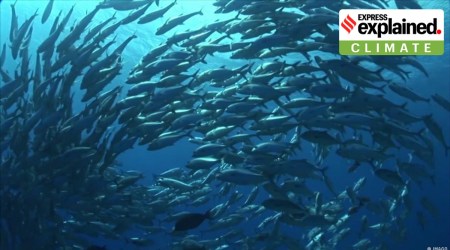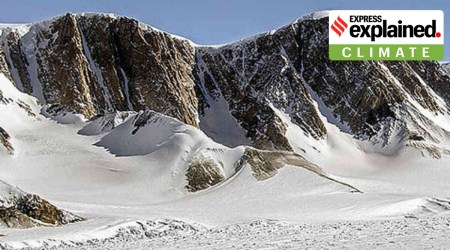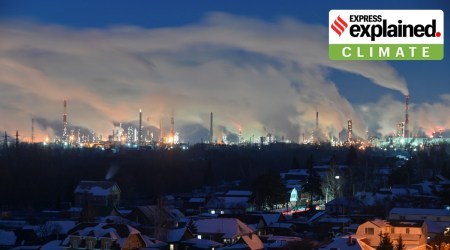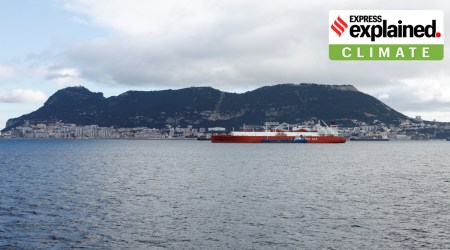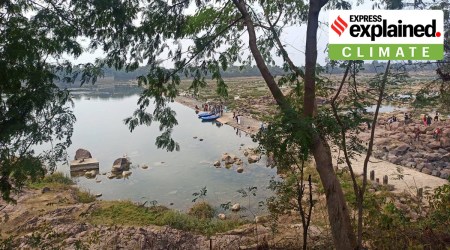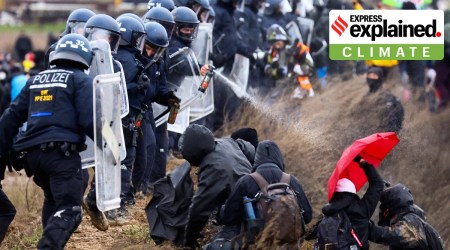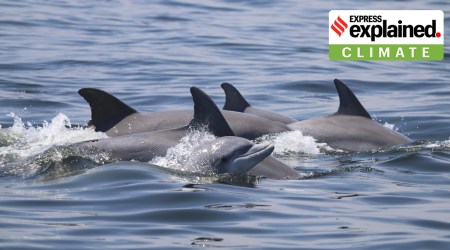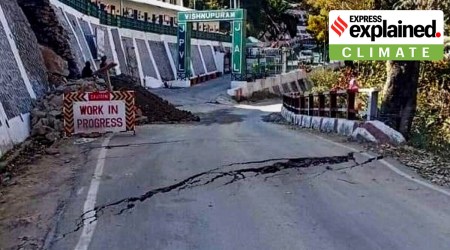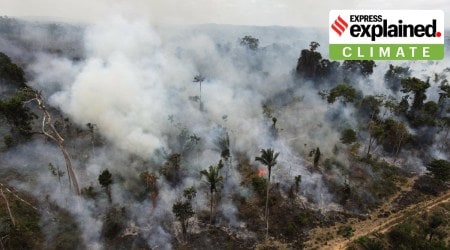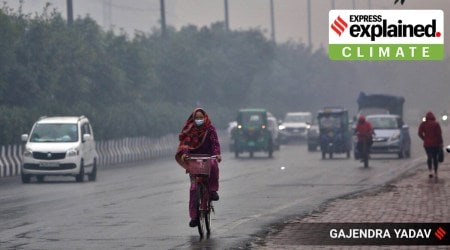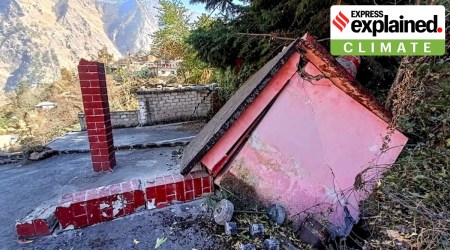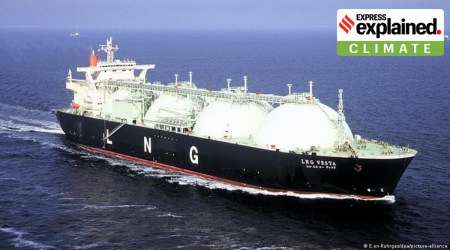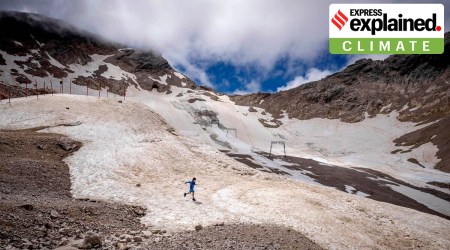EXPLAINED CLIMATE NEWS - Page 17
Why Venice’s famous canals are now dryingSubscriber Only
A high-pressure system is stuck over Venice, creating low tides, which has led to low water levels and dry canals. However, experts suggest the root cause behind the issue is the drought-like situation across Italy.
How to save our high seas from overfishing, pollutionSubscriber Only
Although the high seas make up more than half of the surface of the Earth and 61% of all oceans, only 1% of international waters are under protection.
Unusual February heat, and the ‘normal abnormal’ in global weatherSubscriber Only
Over the past week, however, maximum temperatures have been 5-11 degrees C higher than normal in most parts of northern and western India. Why is it already so hot in parts of India? Is this an indicator of how hot the summer, or the rest of the year, will be?
14 pilot whales stranded in Sri Lanka: What is whale stranding and why does it happen?Subscriber Only
Whale stranding is a phenomenon in which whales are stuck on land, usually on a beach. Other aquatic animals like dolphins and porpoises are also known to beach.
‘Millions’ in India, Pakistan at risk of flooding from glacial lakes: What a new study saysSubscriber Only
India and Pakistan make up one-third of the total number of people globally exposed to glacial lake outburst floods — around three million people in India and around two million people in Pakistan.
Can debt swaps be a game-changer for poor nations to go green?
The world's poorest countries owe $62 billion in annual debt service, a year-on-year increase of 35%, the World Bank said in December, warning of a rising risk of defaults.
Could oil industry bumper profits grow bigger?Subscriber Only
The same five Western oil giants — ExxonMobil, Shell, Chevron, BP and Total — who made huge losses in 2020, have just collectively announced more than $196 billion in annual profits, helped on by a spike in oil demand with the Ukraine war and the post-pandemic recovery.
European Union unveils its ‘Green Deal Industrial Plan’: What does it entail?Subscriber Only
EU Green Deal Industrial Plan: The proposal involves building a simpler regulatory framework, providing faster access to funds, enhancing skills and improving the EU’s trade network.
MISHTI, Amrit Dharohar, PM PRANAM: Conservation initiatives in the BudgetSubscriber Only
In her budget speech, FM Nirmala Sitharaman announced multiple schemes towards protection and conservation of India's natural heritage, including mangroves and wetlands.
How do cows and sheep contribute to climate change?Subscriber Only
Ruminant species release methane through burps during the process of digesting the organic matter that they eat. Bill Gates, Jeff Bezos, and Jack Ma have financially backed scientific efforts to tweak the animals’ diet so that they release less methane
What is Liquified Natural Gas (LNG), and how it impacts the climateSubscriber Only
LNG is to compensate for lost Russian gas supplies, amid the war in Ukraine. But though touted as a short-term fix, many fear the gas is here for the long haul as the EU becomes the biggest LNG importer in the world.
Cost of green clearance violations: Recalling 3 cases opened by NGT in Chhattisgarh and OdishaSubscriber Only
This is one of the three cases initiated by the NGT taking suo motu cognisance of The Indian Express report (February 4, 2022) on six mega projects where stringent clearance conditions to compensate for the high environmental impact were sidestepped, ignored, or met only on paper.
How human disturbance can alter habitats, routines of animalsSubscriber Only
New study suggests that human disturbance can squeeze animals closer together, increasing the odds that they bump into each other.
Protests in Germany against coal mine expansion: Has Russia Ukraine conflict forced Europe to use more coal?Subscriber Only
Germany protests: Ever since the Russian invasion of Ukraine in 2022, several countries, especially European nations, have been facing an energy crisis. How has their coal use been impacted?
Noise pollution affects dolphins’ ability to communicate: What new study saysSubscriber Only
Noise from large commercial ships, military sonars or offshore drilling can severely impact the well-being of dolphins. Here is how.
Why UAE’s Sultan Al Jaber, an oil company CEO, has caused controversy for heading climate change conferenceSubscriber Only
UAE’s choice of Sultan Al Jaber, its industry minister and chief of a large oil company, as COP president has outraged climate activists. What do COP presidents do, what influence do they have on outcomes?
Satellite images show Joshimath sank 5.4cm in just 12 days: Why it might have happenedSubscriber Only
The images and report have come just days after cracks appeared in many roads and hundreds of houses in the city, which has now been declared as a landslide and subsidence-hit zone by the authorities
Why a new study claims logged tropical forests can emit carbon into the atmosphereSubscriber Only
A new study challenges the earlier assumption that logged forests are 'carbon sinks'. We explain why.
California’s record-breaking storm: What is the ‘Pineapple Express’ phenomenon underlying itSubscriber Only
Over the past two weeks, California and other parts of the West Coast have been hit with a series of what meteorologists call atmospheric rivers.
Ozone hole, filling up now: What this means for climate actionSubscriber Only
A new assessment says the ozone layer will recover to 1980 values by 2066 over Antarctica; in Artic by 2045. The success of the Montreal Protocol is noteworthy, but phasing out greenhouse gases is more difficult.
What is a cold wave, why northwest India is shiveringSubscriber Only
While lower-than-normal temperatures were recorded over parts of Northwest India from the last week of December, these conditions intensified in the first week of January.
Joshimath crisis: What is land subsidence and why does it happen?Subscriber Only
Joshimath sinking: The exact reason behind Joshimath land subsidence is still unknown but experts cite unplanned construction, over-population, obstruction of the natural flow of water, and hydel power activities as possible causes.
Europe turns to LNG instead of Russia gas: What is it, how it impacts the climateSubscriber Only
As liquified natural gas tankers carrying fracked US gas start to land in northern Germany, climate activists are calling it a major setback in the effort to limit global heating.
What is causing the winter heat wave in Europe?Subscriber Only
At least seven countries have recorded their hottest January weather ever. These included Poland, Denmark, the Czech Republic, the Netherlands, Belarus, Lithuania and Latvia. Here is why.
How termite behaviour is linked to a warming world: Findings of a new studySubscriber Only
The study revealed that as the Earth gets warmer, termites will rapidly spread across the world. This could, in turn, lead to a further rise in global temperatures. Here is why.
BEST OF EXPRESS



Must Read



